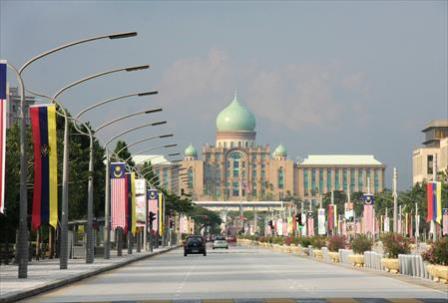
Almost eight years after the Malaysian Catholic newspaper the Herald first sought to overthrow a government ban on it using the word ‘Allah’ for ‘God’ in its publication the judicial appeal process appears to have ended in failure.
A federal court in Kuala Lumpur ruled on June 23 that it would not grant the Catholic church permission to appeal against the decision.
The court decided in October 2013 that only Malay Muslims had an exclusive right to use the word ‘Allah’ even though the word precedes the birth of Islam.
The government’s order allowing only Muslims to use the word “Allah” is particularly frustrating to Christians in multiracial Malaysia, a nation once tolerant of all creeds.
The indigenous Sabah and Sarawak people, who constitute 70% of the country’s Christian population, have been using the word in their theological vocabulary — both in worship in the Malay language, or in written form in the Malay Bible, the Alkitab — for more than 100 years.
The church stands to defend its legitimate right to freedom of worship has over the years led to punitive arson attacks against churches, threats to both burn and seize the Bible by the state’s Islamic authorities, amid other acts of provocation.
The Christian Federation of Malaysia voiced its disappointment yesterday at the federal court’s decision. It said: “Simple justice would have mandated an appeal to rectify the many incorrect and inaccurate statements and observations of the Court of Appeal.”
Rev. Dr Hermen Shastri, Secretary General of the Council of Churches, described the decision of the highest court of the land.
He told World Watch Monitor that while there was little legal recourse left to the Catholic church, it would probably take the extraordinary step of asking the federal court to review its own judgment so as to uphold constitutional guarantees of religious freedom.
Amnesty International responded with a statement that the “Allah” ban should be scrapped.
“Malaysia’s ban on Christians using the word ‘Allah’ to refer to God is an abuse against free speech…The idea that non-Muslims could face prosecution for using a particular word is deeply disturbing,” said its Malaysia researcher Hazel Galang-Folli. “This ban… risks further inflaming religious tensions in Malaysia by denying its people the right to freedom of religion.”
The overwhelming public opinion of Christians in the country, who took to social media to express their disappointment, was that the federal court should have allowed the church leave to appeal, especially since three of the judges on the seven-member Bench dissented against the decision.
Immediately after the verdict the Malaysian Government declared that Christians, who form about 10% of the mainly Malay-Muslim population of 30 million, could still use the word Allah in church, since the ban only applied to the Herald.
A government statement said: “Malaysia is a multi-faith country and it is important that differences are managed peacefully in accordance with the rule of law and through dialogue, mutual respect and compromise.”
It added that the government remains committed to its negotiated ‘ten-point solution’- first announced in 2011 – to resolve difference in views between Christians and Muslims. A key element of this declaration emphasises that Christians are allowed to print, import and distribute Bibles in the Malay language. The official pronouncements have done little to appease Christian leaders such as Dr Shastri, who fear this latest federal court ruling will only strengthen extremist voices of Malay-Muslim extremists whose militant actions have brought little censure from the Government or the forces of law.
These show contempt for legal authority and the leadership of Prime Minister Najib Abdul Razak.

Six months after the forced entry into (and seizure of more than 300 copies of the scripture from) the Bible Society of Malaysia, the Islamic Religious Department of the state of Selangor and the Islamic Religious Council of the same state have refused to return the books, despite being asked to do so by the Attorney General and the Prime Minister.
The Islamic authorities have instead hinted that the 321 Bibles will be destroyed.
The Bible Society said such an act would be abhorrent. Its President, Bishop Ng Moon Hing, in a statement said: “Bibles are religious books of the Christian community. Under what civil law do (they) purport to have the authority to even suggest such an act?”
Dr Shastri said the Islamic authorities were demonstrating a dangerous disregard for the law, and the federal court decision will further blur the demarcation between Islamic jurisdiction in public life and civil laws.
He said the ruling did not address the key issues of constitutional rights, religious freedom and whether the government had the power to regulate sacred books.
Dr Shastri emphasised that the Bible had been translated into many languages, just as Hindu scriptures and the Quran into English and other languages for the sake of humanity. “The State has no right to regulate or contain religious practices.”
The decision was welcomed by extreme nationalist Malay groups who warned the Catholic church to stop issuing statements or challenging the authority of the federal court. One group that propagates Islamic ties said the ruling confirmed its view that Malaysia was an Islamic state and not a secular one.
The Muslim extremist groups also maintained this week that the Allah word should be expunged from all Malay-language Bibles.
Religious provocation and persecution has become a constant feature of life in Malaysia.
In recent weeks the country was gripped by a debate on hudud – the Islamic law that prescribes stoning to death and cutting off limbs for crimes – which the opposition Islamic Party PAS wants to introduce in the state of Kelantan. Extreme Islamist groups favour its enactment and, significantly, say that the law should also apply to non-Muslims.
Earlier this month Islamic religious authorities suddenly interrupted a Chinese funeral and seized the body of a 38-year-old waitress. It was claimed that she had converted to Islam when she was a teenager, and therefore she should not be buried in a Taoist ceremony. Her family contested this; four days later she was buried – as originally planned – on being declared to be, in fact, a non-Muslim.
In May, a civil court ruled that a Hindu convert to Islam should return his six-year-old son to the Hindu mother. To date he has not done so because it is claimed he obtained custody of the child from a Muslim Sharia court.
Such inter-faith battles based on conflicting legal systems are polarising the nation, as well as appearing to make a mockery of the country’s legal systems.
Some are concerned that the federal court’s reluctance to test constitutional guarantees of religious freedom will encourage Malay-Muslim extremists to further push out the boundaries of Islam, and shrink the space for other faith groups freedom to worship.